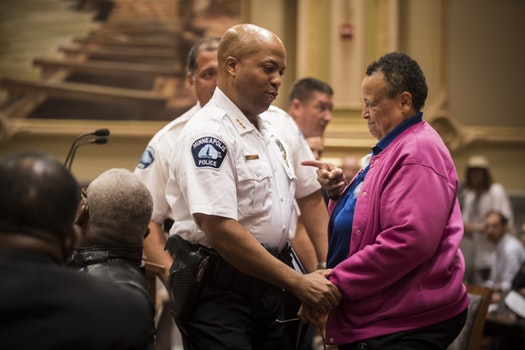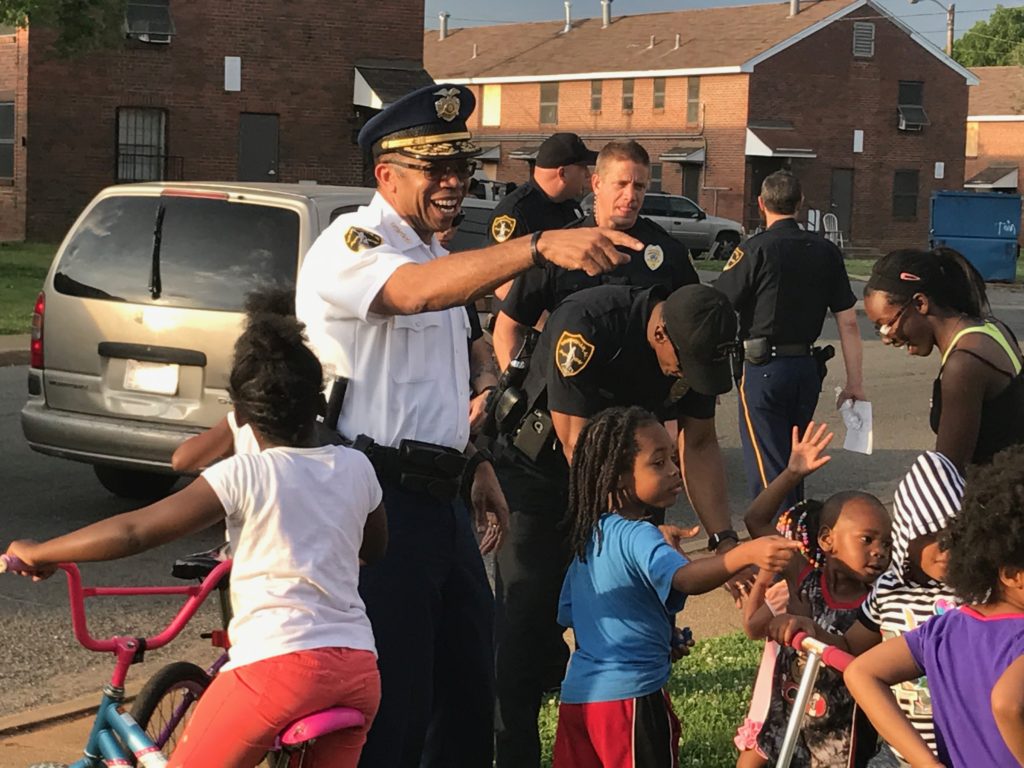CONTACT: Rachel Teicher, Project Director T: 212-393-6356 E: rteicher@jjay.cuny.edu
CLEARINGHOUSE WEBSITE: trustandjustice.org
In September 2014, Attorney General Eric Holder announced that the Department of Justice has awarded the National Network for Safe Communities, through John Jay College of Criminal Justice, a three-year, $4.75 million grant to launch a National Initiative for Building Community Trust and Justice. The National Initiative is directed by Professor David Kennedy, Amy Crawford is the project manager, and John Jay College President Jeremy Travis, Professor Tracey Meares and Professor Tom Tyler of Yale Law School, Professor Phillip Atiba Goff of UCLA, and Dr. Nancy La Vigne and Dr. Jocelyn Fontaine of the Urban Institute are principal partners. The National Initiative is designed to improve relationships and increase trust between minority communities and the criminal justice system. It also aims to advance the public and scholarly understandings of the issues contributing to those relationships.
The National Initiative will highlight three areas that hold great promise for concrete, rapid progress:
The National Initiative is combining existing and newly developed interventions informed by these ideas in six pilot sites around the country. The six pilot sites, announced in March 2015, are Birmingham, Alabama; Ft. Worth, Texas; Gary, Indiana; Minneapolis, Minnesota; Pittsburgh, Pennsylvania; and Stockton, California.
The National Initiative is also developing and implementing interventions for victims of domestic violence and other crimes, youth, and the LGBTQI community; conducting research and evaluations; and maintaining a national clearinghouse website at trustandjustice.org, where information, research, and technical assistance are readily accessible for law enforcement, criminal justice practitioners and community leaders. Through the Office of Justice Program’s Diagnostic Center, police departments and community groups can request training, peer mentoring, expert consultation and other types of assistance on implicit bias, procedural justice and racial reconciliation. The initiative will be guided by a board of advisors which will include national leaders from law enforcement, academia and faith-based groups, as well as community stakeholders and civil rights advocates.
ABOUT THE INITIATIVE TEAM
David M. Kennedy has worked for over 20 years to bring reconciliation and substantive change to America’s most distressed communities. He has pioneered strategies for working in real-time partnership with stakeholders at all levels, taking on particular important problems, developing and directing large-scale interventions, and promulgating them nationally. Central to his extensive field work has been a process of racial reconciliation that Kennedy designed by engaging communities historically divided from law enforcement, dispelling toxic misunderstandings between them, fostering a process of truth-telling that allows them to find common ground and address serious violence in partnership, and allowing law enforcement to step back and communities to reset their own public safety standards. Kennedy is the director of the National Network for Safe Communities (NNSC), a project of John Jay College of Criminal Justice. Kennedy’s history in this area includes the Boston Gun Project, which created the now widely-applied “Operation Ceasefire” Group Violence Intervention and reduced youth gun violence citywide; the High Point Drug Market Intervention; the Justice Department’s Strategic Approaches to Community Safety Initiative, which was the applied nationally as Project Safe Neighborhoods; the Treasury Department’s Youth Crime Gun Interdiction Initiative; the Bureau of Justice Assistance’s Drug Market Intervention; and the theoretical development of focused deterrence, which has informed a range of proved interventions focused on homicide, gun violence, drug markets, and community corrections.
Rachel Teicher is the Project Director of the National Initiative for Building Community Trust and Justice. Ms. Teicher oversees all National Initiative research and strategic implementation in its six pilot sites. Prior to joining the National Network, Ms. Teicher worked as the Director of Strategic Coordination in the New York City Mayor’s Office to Combat Domestic Violence. She helped develop new initiatives in concert with various community partners and was responsible for managing the agency’s four Self-Sufficiency programs focusing on a wide range of survivor concerns. While at the Mayor’s Office, Ms. Teicher was also part of the administrative team that oversaw the Brooklyn Family Justice Center. Ms. Teicher also served as the Outreach Director in the Office of External Affairs at the New York City Department of Social Services where she developed and managed a new community outreach initiative addressing issues of economic inequality, food insecurity, and emergency assistance. Ms. Teicher previously worked with STEPS to End Family Violence and Mt. Sinai Hospital’s Sexual Assault and Violence Intervention Program. Teicher holds a law degree from Hofstra University, a master's degree in humanities and social thought from New York University, and a bachelor's degree in sociology from Haverford College.
Tom R. Tyler, PhD, brings to the effort his reputation for creating “paradigm shifting scholarship in the study of law and society,” for which he won the Law and Society Association Harry Kalven prize in 2000. He is the Macklin Fleming Professor of Law and Professor of Psychology at Yale Law School. Prior to coming to Yale, he also taught at New York University, the University of California, Berkeley, and Northwestern University. Dr. Tyler has done extensive research and published numerous articles, books, and chapters on how individuals’ judgments about the justice or injustice of certain procedures shape their subsequent legitimacy, compliance, and cooperation, particularly in the field of interactions with law enforcement. Dr. Tyler has worked extensively with Tracey Meares to research and publish findings on police legitimacy and procedural justice and advise agencies on the practical use of these concepts in the field.
Tracey L. Meares, JD, is one of the leading national theorists on police legitimacy and, in particular, how racial narratives influence police relationships with minority communities and how deliberate attention to these issues can influence community compliance with the law. She is a Walton Hale Hamilton Professor at Yale Law School, before which she was Max Pam Professor of Law and Director of the Center for Studies in Criminal Justice at the University of Chicago Law School. Her research focuses on communities, police legitimacy, and legal policy.
Phillip A. Goff, PhD, is best known for his work exploring “racism without racists,” the notion that contextual factors—even absent racial hostility—can facilitate racially unjust outcomes. His research is the first to link psychological factors to an officer’s use of force history, creating the first empirical model for predicting police violence and racial bias in police brutality. Dr. Goff is an Assistant Professor at the University of California, Los Angeles. He has worked as an equity researcher and consultant for police departments around the country, and he has recently established the Center for Policing Equity (CPE) at UCLA. This national action research network counts more than 75 researchers and numerous major cities as collaborators, each of which provide unfettered access to data for the purposes of creating new research, sparking policy changes and promoting community accountability.
Nancy La Vigne, PhD, has over twenty years of experience as a researcher and evaluator of criminal justice programs, policies, and technologies and brings a wealth of methodological, research, and management expertise to the team. She is the lead author on an upcoming COPS Office report on “stop and frisk,” which explains to a law enforcement audience the potentially negative impact of the practice on police-community relations and describes methods to carry out citizen contacts lawfully, respectfully, and in accordance with the tenets of community policing and procedural justice. Under her leadership, the Justice Policy Center has conducted research projects on justice reinvestment, police accountability, and civilian oversight of the criminal justice system.
Jocelyn Fontaine, PhD, leads research projects that evaluate the impact of community-based initiatives at the individual, family, and community level through both qualitative and quantitative data analysis. She has experience developing survey instruments, facilitating focus groups, conducting fieldwork in a variety of settings, facilitating stakeholder interviews, and translating best practices into program implementation.
To improve relationships with communities of color, a reconciliation movement has begun in several cities, in which police brush up on their history, admit past mistakes, and listen to frank talk and hard truths.
A unique idea is about to become reality for Minneapolis Police Chief Medaria Arradondo.
Chief Arradondo came up with the position of “community navigator” and asked the City Council to approve the budget for it. While Chief Arradondo wanted two dozen positions, the council gave him four.
The chief hopes a Minneapolis Police Department community navigator can help create a better connection with people in the city.
“We are not going to be able really to arrest these problems away, nor do I as chief want to see our department in any way shape or form criminalizing some of these conditions that effect our city,” said Chief Medaria Arradondo.
Through Tuesday afternoon, the city had seen 14 non-fatal shootings in 2018, Cmdr. Joseph said, compared to 31 through the same period last year — a 55 percent decrease.
He attributes the decline to the bureau’s Group Violence Intervention [GVI], a strategy that aims to reduce gang-related gun violence by targeting the city’s most violent gang members while also offering social services and support to those who agree to stop shooting.
In this op-ed for Governing Magazine, IPVI Director Rachel Teicher explains why victims of intimate partner and domestic violence don't trust the criminal justice system, and outlines how procedural justice can improve victim perceptions of law enforcement. "This trust could provide the foundation for a new vision of public safety: safer communities that are empowered by positive, ongoing and successful cooperation with law enforcement. Increased confidence in criminal-justice practitioners improves victim participation and offender accountability, and it provides law enforcement with the resources it needs to address and ultimately reduce these violent crimes."
In this op-ed for The Hill, two Pittsburgh Bureau of Police officers involved with the National Initiative for Building Community Trust and Justice explain why they feel it's important for police to understand the history of race in America (and how police departments are perceived by marginalized communities). "By addressing concrete aspects of local and national history, procedural justice training places each officer’s identity and perceptions into the context of a broader historical perspective."
In this piece, Vox's German Lopez cites NNSC Director David Kennedy on how to improve police-community relations. The first step? Police must acknowledge the history of harm perpetuated by their institutions, else community distrust of law enforcement will persist.

Recently confirmed Minneapolis Police Chief Medaria Arradondo, acknowledging the historical mistreatment of minorities by law enforcement: "When legislative laws came down, whether it's segregating our schools or universities, police were the people on the front lines that were thrust into those very hot-button social issues. This has not changed today."
As Yale Law School's Tracey Meares and Tom Tyler write in the anthology "Policing the Black Man," "the more trust communities have in the police, the more likely they are to report crime, provide testimony and help 'to hold offenders accountable.'"
Birmingham Police Chief A.C. Roper: "Although it takes time, [our violence reduction] is starting to see positive results. For example, in this segment of our population, homicides are down 33 percent and non- fatal shootings are down 60 percent for the first half of this year."

Acting Minneapolis Police Department (MPD) Chief Medaria Arradondo, who is taking over for recently resigned Chief Janee Harteau, has been on the force for 28 years, and has been instrumental in MPD's work with the National Initiative for Building Community Trust and Justice.